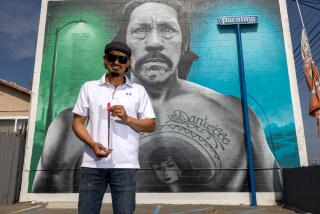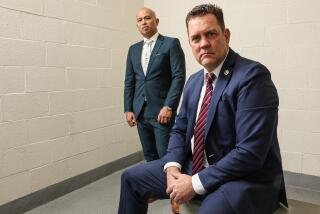Repairing ‘broken windows’
I’ve been thinking a lot lately about “broken windows,” the theory that minor neighborhood blight — left unchecked — emboldens troublemakers and encourages crime.
The idea was advanced 30 years ago by social scientist James Q. Wilson, whose death this month brought it new acclaim.
Its premise is simple: Graffiti allowed to remain on a wall invites more tagger scrawls; trash allowed to pile up in a vacant lot turns that spot into a dumping ground; rowdy teens holding court in a neighborhood park frighten families into staying home behind locked doors.
Neighbors disengage. Community standards drop. Criminals take the reins.
As Wilson and criminologist George L. Kelling put it when they introduced the concept: “Communal barriers — the sense of mutual regard and the obligations of civility — are lowered by actions that seem to signal that ‘no one cares.’ ”
That notion gave birth to “community policing,” which has transformed law enforcement tactics in big cities around the country, including here in Los Angeles.
Now, in neighborhoods newly muscled by rising hope and falling crime, residents are flexing big and fighting back.
::
Jonesey Harp doesn’t need a social scientist to tell her how “broken windows” plays out. She’s learned firsthand since she and her husband moved from the Westside to the Hyde Park area of South Los Angeles three years ago.
He taught at a high school nearby and she was about to return to college. They wanted a place of their own, with a front porch and a backyard for their dog. The foreclosed fixer-upper near Van Ness and Slauson avenues was affordable at $119,000.
It was walking distance of a park with a swimming pool and tennis courts. A few blocks away was a shopping center with a Home Depot for their repair projects and a Food 4 Less with decent produce at good prices.
“There’s even a Starbucks, with a drive-thru,” Harp pointed out, as I toured the neighborhood with the couple on Saturday. “That’s something we didn’t have on the Westside.”
It didn’t matter that they were white and almost all of their neighbors were black or brown. They thought they’d found a neighborhood where they could put roots down.
“We knew we weren’t moving into Bel-Air,” Harp said. “But we didn’t think everything would be so hard.”
They found institutional barriers; an attitude among authorities that second-class was good enough.
The swimming pool at Van Ness Recreation Center had been empty and blocked off for years. The tennis courts were padlocked. Stray dogs roamed the park. Vagrants slept in the shrubbery. Prostitutes worked the sidewalks.
Harp questioned, complained, offered to help. She found funding for a tennis camp and dog obedience classes, suggested container gardens and nutrition lessons. But park officials brushed her off, she said.
“They told me the pool was closed because it attracted the ‘wrong element,’ ” Harp said, that gang members had been allowed to put swimming off-limits for hundreds of little kids.
“I feel like in South Los Angeles, our motto should be ‘No We Can’t,’ ” she said. “In our neighborhood, it seems like you just have to settle for so little.
“You would never dream of having somebody living in a car on your block, somebody prostituting in front of your house,” she told me. “You would make a phone call. And somebody would take care of it.”
Harp has made plenty of phone calls:
• To animal services about the wounded dog on a chain with no water in a neighbor’s sweltering backyard.
• To the landlord whose tenants block driveways with their cars and smoke pot in their frontyard.
• To police about the prostitutes she has to pass en route to the market.
• To her city councilman about the giant sinkhole along the curb outside her house.
But not enough has changed, she said. In fact, she said she and her husband, Josh, have become pariahs on their block.
People have been bullied so much, said Josh, “sometimes it must seem easier to keep your head down, look away. But somebody’s got to stand up. That’s the only way things will change.”
::
People are beginning to stand up. They’re patching their own versions of “broken windows” in neighborhoods across Los Angeles — whether it’s the proliferation of pot shops in Eagle Rock or street prostitution creeping into Larchmont.
Sometimes it’s homegrown change, fueled by long-standing block clubs and neighborhood groups.
But sometimes it takes a newcomer to light the fuse; someone unaccustomed to prostitutes hosing off in the frontyard or helicopters rattling the roof all night.
“Some things you can’t know until you live here,” said Jonesey Harp. “And you know not to settle because you’ve lived somewhere else.”
That’s why she complained to an LAPD commander about the nightly noise of what the neighbors call “yard birds.”
“If you can’t sleep because the helicopter’s shaking your house, you’re not going to be able to stay awake in school. How are the kids going to learn?” she asked. The local captain took her concern to heart, she said, and promised to order the copters to fly higher at night.
That got her to thinking, as we talked, about the jagged path of neighborhood progress.
The park’s pool may be padlocked. And, judging from the condom that stuck to my shoe as I got out of the Harps’ car at the park, the prostitutes are still around.
“But I really have to thank the mayor,” Jonesey said. “His Summer Night Lights program saved our park.” The anti-gang program keeps dozens of parks open late every summer, with food, sports leagues and arts programs.
“It brought families out; made everybody feel that it wasn’t so dangerous. All of a sudden we weren’t afraid to come out to our park after dark.”
That led to expanded sports youth leagues and facility improvements. The park now has well-maintained fields and a popular running track.
“I go there in the morning,” Josh Harp said. “And it’s always busy,” with joggers, senior citizens walking laps and mothers pushing baby strollers.
That’s “broken windows” in action.
More to Read
Start your day right
Sign up for Essential California for news, features and recommendations from the L.A. Times and beyond in your inbox six days a week.
You may occasionally receive promotional content from the Los Angeles Times.






